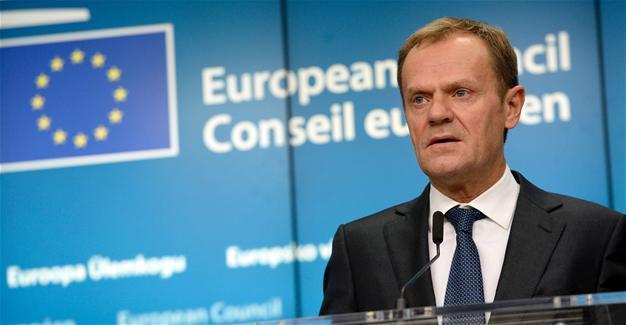EU to seek summit with Turkey in the next months
BRUSSELS
 The president of the European Union said the 28-nation bloc will be seeking to hold a summit meeting with Turkey in the coming months to discuss the strained relations between the two.
The president of the European Union said the 28-nation bloc will be seeking to hold a summit meeting with Turkey in the coming months to discuss the strained relations between the two.“We have a mandate to organize this kind of summit in the next months,” EU Council President Donald Tusk was quoted as saying by state-run Anadolu Agency late Dec. 15, adding that no date had been set yet.
“Today we discussed about this possible summit between our [EU] institutions and authorities of Turkey,” Tusk said, speaking at a news conference after the EU leaders’ summit in Brussels.
The EU would be represented by Tusk and the European Commission president, Jean-Claude Juncker, The Associated Press reported.
Tusk said the EU-Turkey dialogue should continue with meetings in various formats in hopes of addressing the outstanding issues.
“We have to finalize some common initiatives with Turkey. Not only the visa liberalization, we need the fulfilment of our benchmarks,” Tusk said, referring notably to an agreement that has helped curb flows of migrants into Europe and changes to the Turkey-EU customs union.
Turkey and the EU signed a refugee deal in March, which aimed to discourage irregular migration through the Aegean Sea by taking stricter measures against human traffickers and improving the conditions of nearly three million Syrian refugees in Turkey.
The March 18 deal also allowed for the acceleration of Turkey’s EU membership bid and visa-free travel for Turkish nationals within the Schengen area.
In order for Turkish citizens to get visa-free travel inside the EU’s Schengen Zone, Turkey needs to fulfil a total of 72 benchmarks, which also include a change in its anti-terror law.
While the EU wants Turkey to ease its law that defines links to terrorist activities, Turkey says it will not make any amendments as it is fighting various terror groups, among them are the Islamic State of Iraq and the Levant (ISIL), the outlawed Kurdistan Workers’ Party (PKK) and the Fethullahist Terror Organization (FETÖ), which is run by the U.S.-based Islamic preacher Fethullah Gülen and the Turkish government accuses it of orchestrating the July 15 failed coup attempt.
Tusk said that it was still “very difficult for Turkey to fulfil every aspect,” especially when it comes to anti-terror laws.
“I know that this is not a sign of a bad intention, but objectively they [Turkey] are in a very difficult situation,” he added.
Turkey has ‘back-up plans’ if EU fails to keep promises
Meanwhile, Turkish President Recep Tayyip Erdoğan said Dec. 15 that Turkey had back-up plans if the EU failed to keep its promise over visa-free travel for Turks to the passport-free Schengen zone.
"If we do not get the expected outcome regarding the visa issue... if promises are not fulfilled, Turkey will no doubt have a plan B and it will have a plan C," Erdoğan warned during a news conference with his Slovenian counterpart in Ankara.
"We do not have to say 'yes' to every decision made about us. The EU has given us nothing so far," he added, without elaborating.
The EU was due to give Turks visa-free travel at the latest by October and Erdoğan pointed to Latin American countries who already have such privileges.
"Now I say to the world media, what do Latin American countries have to do with the EU?"
He was referring to Colombia and Peru, which were given access to the Schengen Zone in 2015.
Turkey formally applied to become a member of the EU in 1987, while accession talks began in 2005.
In a joint statement dated Nov. 29, 2015, the EU and Turkey had confirmed their commitment to re-energize the accession process.
However, almost a year later, on Nov. 24, the European Parliament approved a non-binding motion to freeze EU membership talks with Turkey, in response to the post-coup crackdown on the alleged followers of FETÖ and recent developments in the country including measures taken within the framework of its fight against terror groups.
















